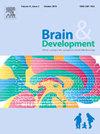患有神经发育障碍的亚洲学龄前儿童的睡眠问题。
IF 1.4
4区 医学
Q4 CLINICAL NEUROLOGY
引用次数: 0
摘要
背景:睡眠对儿童的行为、情绪控制和认知发展起着重要作用。与未患病的儿童相比,患有神经发育障碍(NDDs)的儿童中睡眠问题的发生率更高。有关泰国学龄前 NDD 儿童睡眠问题的研究为数不多。本研究对患有神经发育障碍的学龄前儿童与发育正常儿童(TD)的睡眠问题进行了比较,并研究了患有神经发育障碍的学龄前儿童的睡眠问题与行为问题之间的关联:使用泰语版《日本学龄前儿童睡眠问卷》(TH-JSQ-P)评估了140名2至6岁患有NDDs(自闭症谱系障碍、注意缺陷/多动障碍、全面发育迟缓和发育性语言障碍)的儿童的睡眠问题,并与285名同龄TD儿童进行了比较。使用儿童行为检查表(CBCL)评估了NDDs组儿童的行为问题。根据调整后的年龄、性别、基础疾病和所用药物对睡眠和行为问题得分进行分析,并在两组之间进行比较:研究发现,48% 的 TD 组和 71% 的 NDDs 组被认定有睡眠问题。NDDs组的TH-JSQ-P总分和五个分量表(包括阻塞性睡眠呼吸暂停、运动性不安腿综合征、寄生虫病、日间行为和失眠/昼夜节律紊乱)的得分明显更高。TH-JSQ-P总分与内化和外化行为问题呈中度相关:研究结果表明,睡眠问题在学龄前 NDD 儿童中比 TD 儿童更常见,并且与内化和外化行为问题相关。本文章由计算机程序翻译,如有差异,请以英文原文为准。
Sleep problems among Asian preschool children with neurodevelopmental disorders
Background
Sleep plays an important role in children's behavior, emotional control, and cognitive development. There is a higher prevalence of sleep problems in children with neurodevelopmental disorders (NDDs) compared to those without disease. There are a few studies regarding sleep problems among Thai preschoolers with NDDs. This study examined sleep problems in preschoolers with NDDs, compared with typically developing children (TD), and studied the association between sleep problems and behavioral problems among preschoolers with NDDs.
Methods
Sleep problems in 140 children aged 2 to 6 years with NDDs; autism spectrum disorders, attention deficit/hyperactivity disorder, global developmental delay, and developmental language disorder were evaluated by using the Thai version of Japanese Sleep Questionnaire for Preschoolers (TH-JSQ-P) and compared with 285 TD children at the same age. Behavioral problems in the NDDs group were evaluated by using the Child Behavioral Checklist (CBCL). Sleep and behavioral problem scores were analyzed by adjusted age, sex, underlying diseases, and medications used and compared between the two groups.
Results
The study found that 48 % of the TD group and 71 % of the NDDs group were identified as having sleep problems. The NDDs group had significantly higher total TH-JSQ-P score and in five subscales, including obstructive sleep apnea, restless leg syndrome-motor, parasomnias, daytime behaviors, and insomnia/circadian rhythm disorders. Total TH-JSQ-P score was found to have a moderate correlation with internalizing and externalizing behavioral problems.
Conclusion
Findings suggest that sleep problems are more common in preschool children with NDDs than in TD children and are associated with internalizing and externalizing behavioral problems.
求助全文
通过发布文献求助,成功后即可免费获取论文全文。
去求助
来源期刊

Brain & Development
医学-临床神经学
CiteScore
3.60
自引率
0.00%
发文量
153
审稿时长
50 days
期刊介绍:
Brain and Development (ISSN 0387-7604) is the Official Journal of the Japanese Society of Child Neurology, and is aimed to promote clinical child neurology and developmental neuroscience.
The journal is devoted to publishing Review Articles, Full Length Original Papers, Case Reports and Letters to the Editor in the field of Child Neurology and related sciences. Proceedings of meetings, and professional announcements will be published at the Editor''s discretion. Letters concerning articles published in Brain and Development and other relevant issues are also welcome.
 求助内容:
求助内容: 应助结果提醒方式:
应助结果提醒方式:


